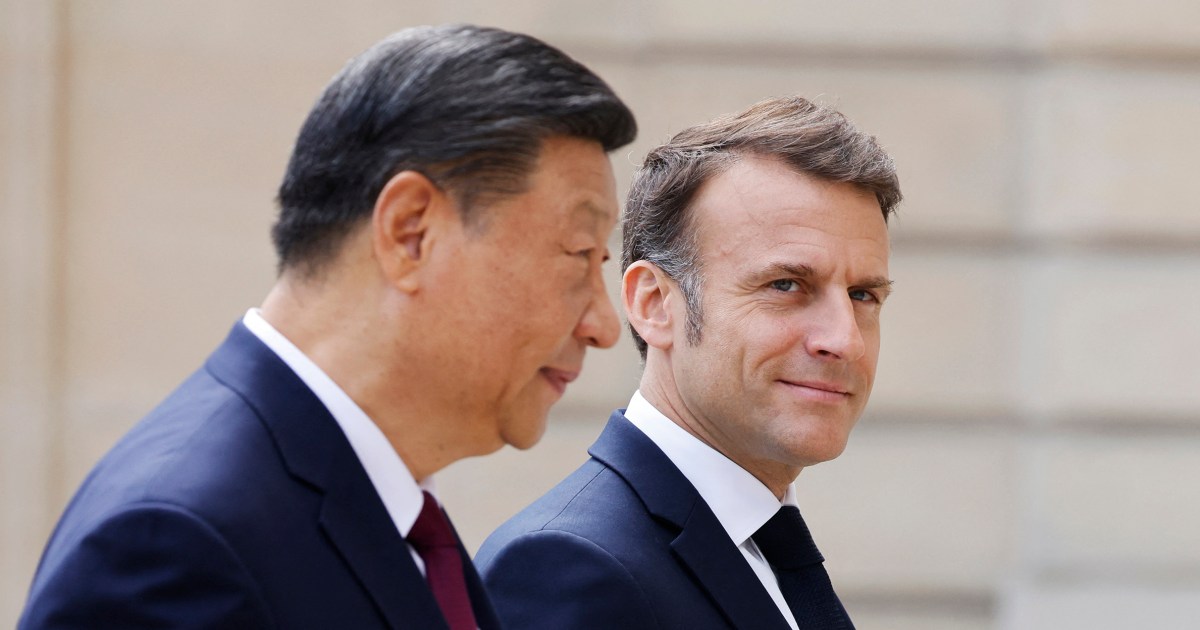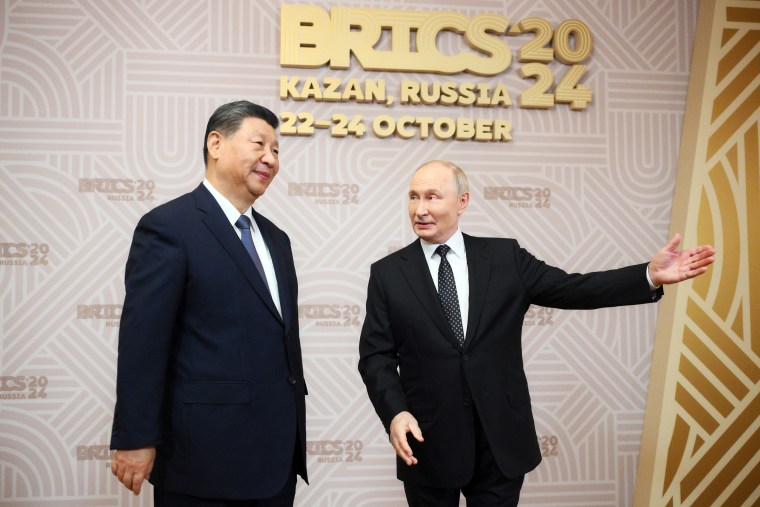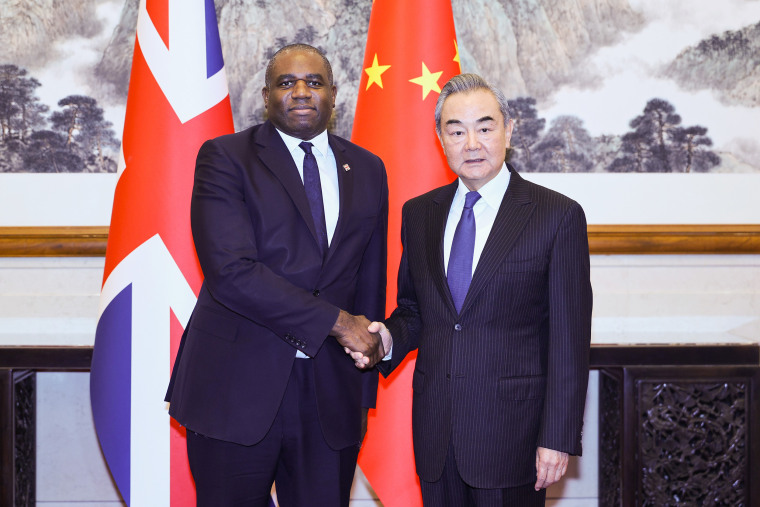Trump’s return may force Europe’s hand on China and Ukraine

DUBAI, United Arab Emirates — Shifting tectonic plates are triggering tremors of uncertainty from Beijing to Brussels as President-elect Donald Trump prepares to take office, and the effects could see U.S. priorities diverge from those of its closest European allies in ways unseen in decades.
The incoming administration is likely to pressure European leaders to take a harder line on China, which it sees as America’s main enemy, but their countries are economically intertwined with both powers and their interests don’t always align with Washington’s, several European officials and diplomats told NBC News. Were Trump to follow through on his vow to impose tariffs on imports on Europe as well as from China, they would likely deviate further.
There is also uncertainty across the continent about what the new White House will mean for the war in Ukraine. Trump has repeatedly said he could end the conflict in one day, and despite Russia’s claims to the contrary, that boast has prompted fears he will push for massive concessions that favor Russian President Vladimir Putin.
“The impact of Trump is panic,” one European Union official told NBC News on Sunday. “They are going to have to make a decision and take a stand.”
But unity appears elusive.
Several European leaders criticized German Chancellor Olaf Scholz after he called Putin to try and persuade him to negotiate last week, becoming the first sitting leader of a major Western country to speak with him since late 2022.
Among them is Ukrainian President Volodymyr Zelenskyy, who said it was “exactly what Putin has long wanted” as he tries to ease his international isolation.
“Europe is freaked out by all this,” the E.U. official added. “People had been saying privately, ‘We’ll see what we do about Ukraine, we’ll see what we do about China.’ But now the world is upside down and they don’t yet know what to do.”
Eyes on Beijing
There are signs that European countries may decide the answer is to move closer to China, potentially opening a rift with the U.S.
During his first administration, Trump was hyperfocused on China, and since then he has maintained his hard-line stance against the country, which both the U.S. and Europe view as an economic competitor and systemic rival, even as they count it among their biggest trading partners.
Days before the U.S. presidential election, Trump’s choice for national security adviser, Rep. Mike Waltz, R-Fla., wrote in The Economist that the next president should quickly end the wars in Ukraine and the Middle East and “finally focus strategic attention where it should be: countering the greater threat from the Chinese Communist Party.”

Relations between Europe and China have deteriorated in recent years over trade, human rights, Chinese aggression in the South China Sea and the status of Taiwan, the self-governing island that Beijing claims as its territory.
They soured further after Russia’s full-scale invasion of Ukraine in February 2022, with some European leaders suggesting Beijing should lean harder on Moscow to end the conflict.
Still, four European diplomats and officials from key Western capitals, who asked not to be named to be able to speak freely, said their countries are not seeking full-on confrontation with China.
“We don’t want to be dragged into the foreign policy toward China which the new American administration will be engaged in,” said one of the senior European officials. “America is our friend and ally. But we have our own foreign policy and our own economic position toward China.”
At the Group of 20 summit meeting in Rio de Janeiro on Monday, Keir Starmer became the first British prime minister since 2018 to meet Chinese President Xi Jinping in person.
Starmer called for “consistent, durable” ties between the two countries, while Xi said they have “vast potential for cooperation.” Though Starmer told reporters he had had a “frank” discussion with Xi about issues where China and Britain disagree, he was criticized by British lawmakers for not publicly condemning the prison sentences handed down this week to 45 pro-democracy figures in the Chinese territory of Hong Kong, as well as the ongoing trial of pro-democracy media tycoon Jimmy Lai, a British national.
Xi also discussed the war in Ukraine as well as E.U. tariffs on Chinese-made electric vehicles in meetings with Scholz and French President Emmanuel Macron on the sidelines of the G20 summit.

In some ways, a second Trump term might be “good news” for Europe, because unlike President Joe Biden, he “wouldn’t care that much” about rallying U.S. allies against China, said Wu Xinbo, director of the Center for American Studies at Fudan University in Shanghai.
“That will give Europeans more leeway in managing their relations with China,” Wu said Monday at an event hosted by the University of Hong Kong’s Centre on Contemporary China and the World.
He also noted that a series of European leaders and other political figures have already been visiting Beijing in recent months in an effort to strengthen ties.
Chinese officials have also suggested that this could be an opportunity for improved relations with Europe.
“China supports Europe in playing a greater role in international affairs, but does not wish to see it pick a side and provoke bloc confrontation,” Cao Lei, the Chinese Foreign Ministry’s deputy head in charge of European affairs, was quoted as saying by the South China Morning Post this month.
Russian threat
For many Europeans, it is Moscow, not Beijing, that poses an immediate threat. In their view, China could help to pressure Russia over Ukraine as Xi loses patience with a war he did not expect would drag on for almost three years.
One senior European diplomat said that while China has never explicitly condemned Russia’s invasion of Ukraine, it has helped in other ways to rein in Moscow.
“They have been firm with Russia about not using nuclear weapons with Ukraine,” the diplomat said.
China is also concerned about the growing security ties between Russia and North Korea after the two countries signed a comprehensive strategic partnership in June, the diplomat added.
The U.S. and others say that the secretive communist state’s leader, Kim Jong Un, has sent thousands of troops to fight for Russia in Ukraine in exchange for technical assistance with his nuclear and ballistic missile programs.
“China doesn’t want a more capable North Korean military,” the diplomat said. “So I would expect this to be one of those issues that we could talk to the Chinese about seriously.”
Another European diplomat said Moscow will be the wild card in international efforts to end the Ukraine war.
“You can see the need for it from the Ukrainians, you can see the Europeans saying we aren’t going to finance this huge and endless fight,” they said. “It’s trickier to understand what’s in it for Putin.”
Though Moscow has signaled that it is open to talks, Russia’s upper hand on the battlefield may convince Putin that he can achieve more from fighting than settling. But the cost is wearing on European governments, which have provided Ukraine with tens of billions of dollars in military and other assistance.
“The pay, pay, pay strategy wasn’t working,” the E.U. official said. “Europe now just wants to stop the war.”
But it is also desperate to avoid any whiff of surrender.
“The E.U. continues to say that Ukraine will negotiate when Ukraine wants to negotiate,” another European official said, “and that the E.U. will stand by Ukraine to the end.”
Keir Simmons reported from Dubai and Jennifer Jett from Hong Kong.
Related
A New Book Argues That What Happens in Europe Doesn’t…
Remaking the World: European Distinctiveness and the Transformation of Politics, Culture, and the Economy by Jerrold Seigel “No issue in world
Poland plans military training for every adult male amid growing…
Poland’s prime minister, Donald Tusk, has said his government is working on a plan to prepare large-scale military training for every adult male in response t
2025 European Athletics Indoor Championships: Ditaji Kambundji secures women’s 60m…
Switzerland’s Ditaji Kambundji walked away from the 2025 European Athletics Indoor Championships in Apeldoorn on 7 March with much more than her first Europea
Takeaways from the EU’s landmark security summit after Trump said…
BRUSSELS (AP) — European Union leaders are trumpeting their endorsement of a plan to free up hundreds of billions of








